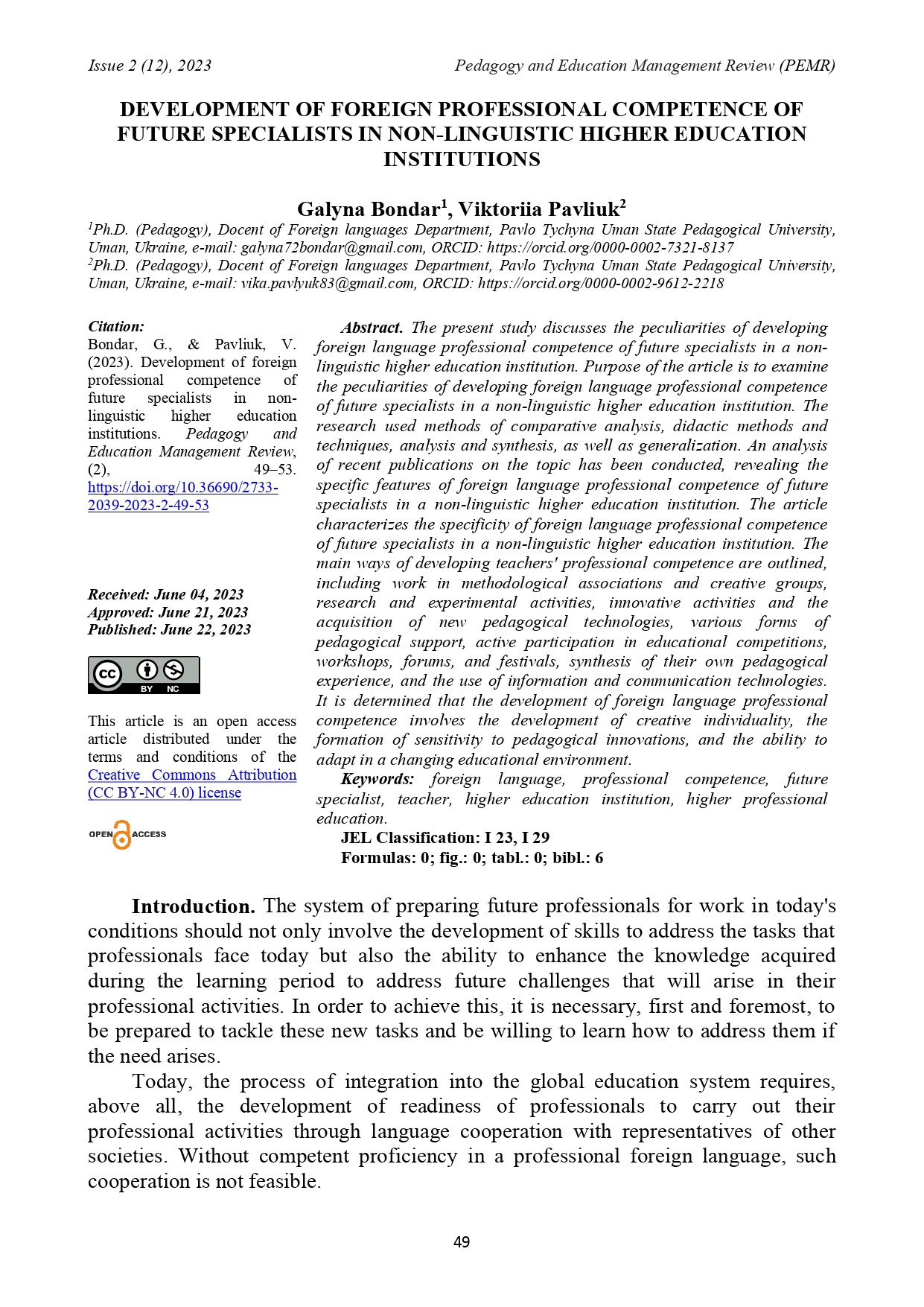DEVELOPMENT OF FOREIGN PROFESSIONAL COMPETENCE OF FUTURE SPECIALISTS IN NON-LINGUISTIC HIGHER EDUCATION INSTITUTIONS
DOI:
https://doi.org/10.36690/2733-2039-2023-2-49-53Keywords:
foreign language, professional competence, future specialist, teacher, higher education institution, higher professional educationAbstract
The present study discusses the peculiarities of developing foreign language professional competence of future specialists in a non-linguistic higher education institution. Purpose of the article is to examine the peculiarities of developing foreign language professional competence of future specialists in a non-linguistic higher education institution. The research used methods of comparative analysis, didactic methods and techniques, analysis and synthesis, as well as generalization. An analysis of recent publications on the topic has been conducted, revealing the specific features of foreign language professional competence of future specialists in a non-linguistic higher education institution. The article characterizes the specificity of foreign language professional competence of future specialists in a non-linguistic higher education institution. The main ways of developing teachers' professional competence are outlined, including work in methodological associations and creative groups, research and experimental activities, innovative activities and the acquisition of new pedagogical technologies, various forms of pedagogical support, active participation in educational competitions, workshops, forums, and festivals, synthesis of their own pedagogical experience, and the use of information and communication technologies. It is determined that the development of foreign language professional competence involves the development of creative individuality, the formation of sensitivity to pedagogical innovations, and the ability to adapt in a changing educational environment.
Downloads
References
Sіdun M. M. Forming the professional competence of future primary school foreign language teachers. Foreign Languages in Educational Institutions: Scientific and Methodological Journal. Kyiv, 2008. No. 4 (32). P. 118–124.
Mykytenko N. O. Formation of foreign language professional competence of future specialists in the process of studying a foreign language for specific purposes. Problems and Prospects of Linguistic Research in the Context of Globalization Processes: Proceedings of the II International Scientific and Practical Conference (Ternopil, October 15-16, 2009). Ternopil: TNEU, 2009. P. 207–208.
Mykytenko N. O. Methodological foundations of forming foreign language professional competence of future specialists in natural sciences. Pedagogical Almanac: Collection of Scientific Works. Kherson: RIPO, 2011. Issue 11. P. 176–187.
Tatarenko I. Competence as a requirement of modernity. Svitlo. 1996. No. 1. P. 57-64.
Bialyk, O., & Honcharuk, V. (2023). Professional training of the modern teacher in the conditions of distance education. Pedagogy and Education Management Review, (1), 44–50. https://doi.org/10.36690/2733-2039-2023-1-44
Nastenko, O., Chornyi, I., & Khanykina, N. (2021). Distance learning and interactive methods of teaching ukrainian as a foreign language. Pedagogy and Education Management Review, (2), 21–29. https://doi.org/10.36690/2733-2039-2021-2-21.







